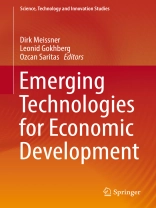This book provides an impressive overview of emerging technologies, especially nanotechnologies and biotechnologies, and their prospective applications. It identifies and describes existing and potential markets for emerging technology-based applications, and projects scenarios for macroeconomic development based on these technologies. Integrated roadmaps for the development of a nano- and bioindustry are shown and policy measures and corporate strategies developed to advance these technologies. These measures are illustrated using roadmaps and policy case studies.The book combines a practical, comprehensive overview of the technical side of emerging technologies and their applications in various fields with an analysis of market developments and characteristics.
Содержание
Chapter 1: What do Emerging Technologies Mean for Economic Development?.- Part 1: MATERIALS AND MANUFACTURING.- Chapter 2: New Materials: the Case of Carbon Fibers.- Chapter 3: Nanotechnology for High-tech Industries: Light Emitting Diodes.- Chapter 4: Technology Use in Traditional Industries - Catalysts for Petroleum Refining.- Part 2: ENERGY AND TRANSPORT.- Chapter 5: Renewable Energy Technological Potential Assessment for Evidence-based Policy-making.- Chapter 6: Global Market Creationfor Fuel Cell Electric Vehicles.- Chapter 7: Technology Roadmaps: Emerging Technologies in the Aircraft and Shipbuilding Industries.- Part 3: LIVING SYSTEMS AND ENVIRONMENT.- Chapter 8: Water Treatment and Purification: Technological Responses to Grand Challenges.- Chapter 9: Emerging Technologies Identification in Foresight and Strategic Planning: Case of Agriculture and Food Sector.- Chapter 10: Technology Assessment for Container Closure Integrity Testing Technology for Biotech Industry.-Chapter 11: Emerging Technologies, Trends and Wild Cards in Human Enhancement.- Part 4: SECURITY.- Chapter 12: Illuminating the “Dark Side” of Emerging Technologies.- Chapter 13: Defence and Security: New Issues and Impacts.- Chapter 14: Defence 4.0: Internet of Things in Military.- Part 5: CHALLENGES TO STI POLICY.- Chapter 15: How to Stimulate Emergence and Convergence of Technologies?
Об авторе
Prof. Leonid Gokhberg is First Vice-Rector of the Higher School of Economics (HSE) – one of the most prominent research universities in Russia. He is also Director of HSE Institute for Statistical Studies and Economics of Knowledge (ISSEK). He authored over 400 publications in Russian and international peer-reviewed journals as well as monographs and university textbooks on S&T and innovation. Prof. Gokhberg has coordinated dozens of national and international projects, inter alia on S&T and innovation indicators, analyses, foresight and policies, funded by public agencies, businesses and international organizations. Prof. Gokhberg has served as a consultant of OECD, Eurostat, UNESCO, and other international and national agencies. He is also a member of the OECD Government Foresight Network, OECD and Eurostat working groups and task forces on indicators for S&T and innovation, information society and education, advisory boards of prestigious international andnational initiatives. Prof. Gokhberg is editor-in-chief of the Scopus-indexed scientific journal “Foresight and STI Governance’ and participates in editorial boards of several other influential journals. He holds Ph D and Dr. of Sc. degrees in Economics.
Dirk Meissner is Deputy Head of the Laboratory for Science and Technology Studies at HSE and Academic Head of the international Master program “Governance Science, Technology and Innovation”. Dr. Meissner has 15 years experience in research and teaching technology and innovation management and policy. He has strong background in science, technology and innovation for policy making and industrial management with special focus on Foresight and roadmapping, science, technology and innovation policies, funding of research and priority setting. Prior to joining the HSE Dirk was responsible for technology and innovation policy at the presidential office of the Swiss Science and Technology Council. Dirk also has long experience in top level consulting to key decision makers in industry as a management consultant for technology and innovation management with Arthur D. Little. He is and was member of international working groups on technology and innovation policy. Dirk represented Switzerland and currently the Russian Federation at the OECD Working Party on Technology and Innovation Policy.
Ozcan Saritas is Research Professor at the Institute for Statistical Studies and Economics of Knowledge, National Research University, Higher School of Economics, Moscow; a Senior Research Fellow at the Manchester Institute of Innovation Research (MIo IR), Manchester Business School; and the editor of Foresight: the journal of future studies, strategic thinking and policy. Ozcan’s research focuses on innovation research with particular emphasis on socioeconomic and technological Foresight. With a Ph D from the “Foresight and Prospective Studies Programme” of the University of Manchester, Ozcan has introduced novel concepts like “Systemic Foresight Methodology (SFM)”, which has been applied successfully to address long-term issues and Grand Challenges involved in Sustainable Development, Renewable Energies, ICTs, Nanotechnologies, Higher Education and Developmental Studies.












